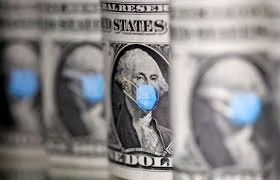We have all heard the horrifying stories how corona patients entered the ICU desperate for oxygen. We also have learned the painful truth that already very sick patients often don’t survive despite the respiratory help. In most countries painful choices had to be made faced with overwhelming numbers of patients to ensure that scarce ICU beds went to those who had highest chance of full recovery.
The analogy is shocking. We might be on the edge of just throwing in trillions of public dollars to keep the economy “alive” while significant parts of our economy urgently need “surgery”.
In the last 50 years neo-liberal economics clearly have concurred the world. The free market economy principles of Milton Friedman (famous for “A society that puts equality before freedom, will get neither. A society that puts freedom before equality will get both”) became commonly accepted. The erosion and finally collapse of Soviet communism did the rest.
Admittedly in this same period globalization of businesses and free market capitalism has spread its benefits of material wealth and technological progress all over the planet resulting even in developing countries in significantly less hunger and early mortality.
But…. there were also some nasty side effects of this unlimited, unrestricted and by-and -large uncontrolled economic growth model where free market capitalism, financial institutions and corporates seem to rule the world with governments standing increasingly helpless and in awe on the side.
Alarming and escalating side effects especially related to climate change, inequalities of income and loss of natural resources.
The asymmetry between public good and private gain in our economic structure clearly causes more and more friction.
However, despite a growing group of responsible operating multinational corporations and a growing army of critical citizens, NGO’, philanthropists, business model innovations, think tanks and enlightened politicians…… we collectively act too slow and have lost already critical years and resources in effectively correcting this asymmetry.
Now, once again, we prepare with public money economic support packages with a magnitude never seen in history to recover from the stand still of the global economy following the COVID-19 pandemic. The patient almost stopped breathing and urgently needs air in the form of trillions of dollars.
So effectively, after 50 years of stepping aside, the public sector is essentially stepping in big time in the global economy. How can we avoid that we waste that opportunity again as happened after 2008!!
Do we, citizens, employees, politicians and business leaders have the courage to stop supporting businesses that are not supporting the public good (like the majority of fossil fuel based industries, mining industries, hedge funds, pharmaceutical companies). Are we willing to deny (unconditional) support to companies that deliberately put their adaptive resilience and future value creation at risk by using their profits for excessive dividends and buying back shares? Can we withstand the undemocratic and obscure pressure of industry lobbies determined to slow down the fundamental changes that are needed?
Or to frame it much more positive. Can we stand united behind a courageous vision to link economic recovery packages to a New Green Deal like the EU now proposes, while being considerate with countries and sectors that need short term painful reforms before seeing the longer term benefits of such an approach? Can we focus public determination more robust than ever on the transition to renewable energy, circularity and regulations for (international) trade to support living income and sustainable practices?
And finally, can we strengthen the efficiency, transparency and competences of public institutions to take back more ownership of social- cultural wellbeing, public healthcare, public transport and public education after decades of failed experiments to privatize these sectors?
In short, the urgent question we need to answer is, do we, the citizens, have courage and foresight to demand a transition to a better world in return for the generous public finance support to the economy during this crisis?
